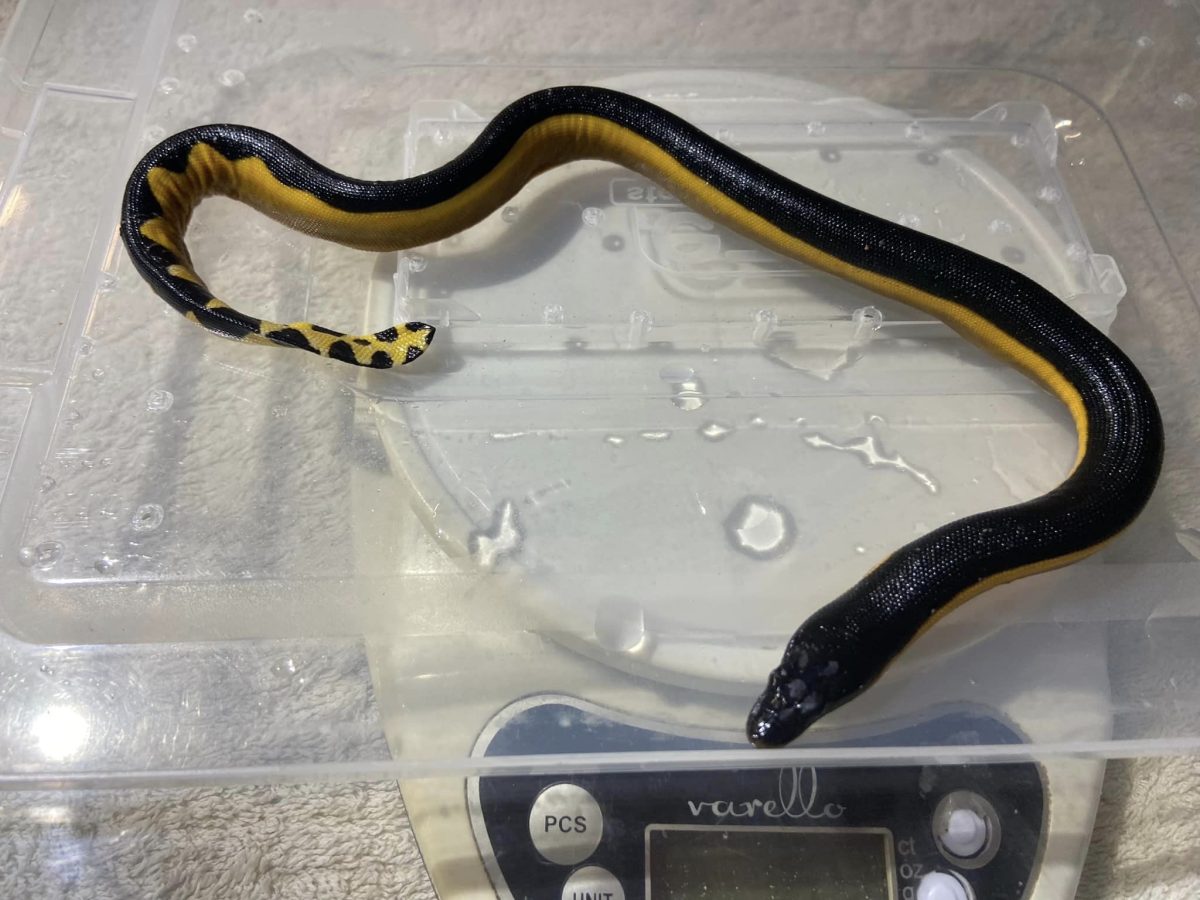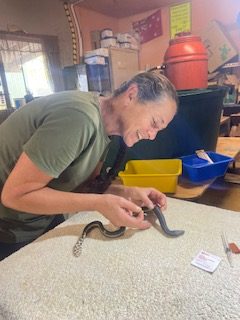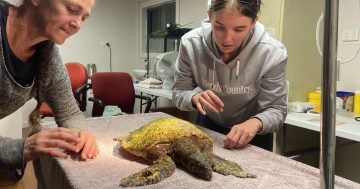
This juvenile yellow-bellied sea snake is in the care of Mudgeroo Emu Farm and Animal Rescue after it washed up on a South Coast beach this week. Photo: Mudgeroo Emu Farm and Animal Rescue Facebook.
A South Coast wildlife refuge has taken in at least three yellow-bellied sea snakes after they washed up on the region’s shores this week.
Belinda Donovan of Mudgeroo Emu Farm and Animal Refuge said she usually treats two to four of the highly venomous pelagic reptiles each year and thinks those that have washed up recently were brought south on an unusually warm ocean current – likely with friends.
“There has been a big eddy of warmer water, and the surface currents are where they drift and can converge in groups,” she said.
“A colony has potentially been swept down, and then these have washed up.”
The first was spotted on a Pambula beach earlier this week but was not reported for 48 hours.
The National Parks and Wildlife Service sent a trained venomous snake handler to retrieve the reptile, which was then taken to Mudgeroo.
Mrs Donovan said its condition was not good and, while carers will do everything they can, its prognosis is poor.
“He had parasites that show he was suffering for some time before going to the beach, and he has a wound he may not recover from,” she said.
“Sitting on the beach for 48 hours didn’t help. He’s been to the vet for x-rays and we’ll do everything we can.”

Trained wildlife carer Belinda Donovan carefully handles a highly venomous yellow-bellied sea snake that washed up on the South Coast this week. Photo: Mudgeroo Emu Farm and Animal Rescue.
The second snake, however, looks much healthier.
It washed up at Broulee on Thursday morning and is the smallest Ms Donovan has ever seen.
“They’re about 22-25 cm when they’re born,” she said.
“This one isn’t much longer than that, and only weighs 35 grams,” she said.
“He’s very fit with no injuries, a gorgeous little guy, and so happy to be rescued.
“He survived being thrown around the surf in the cold water, and they don’t live in the surf zone.
“Hopefully with a 48-hour rest we can have him in the best condition possible to release him in the open water and he can swim his little body up north.”
More sea snakes were reported washed up on South Coast beaches on Friday, however, not all of them survived.
The snakes are known to wash up from Wollongong all the way down to the Victorian border.
Mrs Donovan said sea snakes are so adapted for life in the open ocean that they were completely helpless on land.
When they’re washed up, they are unable to move far and are unable to feed.
Their fragile bodies are unable to support themselves out of the water.
Well-meaning passers-by who toss them back into the surf can unknowingly cause fatal injuries.
“They have so many adaptations. For example, their body is laterally compressed to help them swim, with a paddle for a tail,” she said.
“Their nostrils are valved and have a seal for excluding seawater.
“They exchange gases through their skin of oxygen and carbon dioxide so that they can stay submerged for up to three hours without breathing.
“Sea snakes do require fresh water to survive, so they drink droplets of rainwater out in the ocean, left on kelp or floating seaweeds.
“They’re really swift and can swim backwards ready to launch at their prey, which is very strange to see as a snake handler.
“They eat small fish, and have a tiny little mouth, which is probably why there are not a lot of bites recorded. ”
Although there are plenty of yellow-bellied sea snakes around, they are very shy and rarely interact with humans.
Even though they are highly venomous, only one death has been recorded in Australia.
Mrs Donovan asked beachgoers to give any sea snakes they spot plenty of space, and to call the Australian Sea Bird and Turtle Rescue hotline on 0431 282 238, or contact the National Parks and Wildlife Service on 1300 072 757.
To support Mudgeroo Emu Farm and Animal Rescue, head to their website.
Original Article published by Zoe Cartwright on About Regional.













